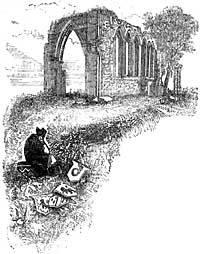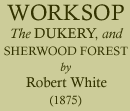< Previous | Contents | Next >

Introduction

IN all historical or topographical researches relating to our towns, villages,or places of interest, our earliest authority is generally the Domesday book.
Sir Henry Ellis in his introduction to the study great survey, thus states original uses and consequences.
"By the completion of this survey, the King acquired an exact knowledge of the possessions of the crown. It afforded him the means of ascertaining the military strength of the country: and it pointed out the possibility of increasing the revenue in some cases, and of lessening the demands of the tax collectors in others. It was moreover a register of appeal for those whose titles to their property might be disputed."
We rarely hear this book mentioned, but our thoughts immediately revert to what must have been the aspect and condition of the country and its inhabitants, at the remote period at which it was compiled. In regard to Worksop, how much the appearance of the country has been changed, when instead of the present highly cultivated fields and meadows a bleak and barren extent of sand presented itself, clothed with heath, gorse, fern, and stunted brush-wood, with here and there, a range of noble forest trees, growing in all the wild luxuriance of nature, undefaced by the hand of man, and tenanted by countless herds of deer and other noble wild game, rarely disturbed, because protected by penal statutes and harsh laws, which elevated above, and gave more protection to, the wild animal than the peasant. So severe and unjust were these laws, that the unauthorised slayer of a deer, a boar or a hare was punished with the loss of his eyes, while the killing of a man could be atoned for by the payment of a moderate composition.
A few acres of land in the valleys or on the river banks gave the only token of cultivation and of the presence of man—a few miserable huts would be scattered here and there, with their little less miserable inhabitants, who derived a scanty subsistence from their hard labour, and that too often mulcted by the rapacity and extortion of their superiors, whom no laws restrained, and with whom might formed the only code of right and wrong, and by whom they were considered in the light of mere beasts of burden and formed for their sole use and pleasure. His black bread, with which he might allay, but could scarcely satisfy his hunger, was seldom accompanied by anything more dainty; and many things which have now become necessaries of life, were to him either utterly unknown, or if known, unattainable. Still more insecure was he from the grievous forays of the neighbouring barons and freebooters, to whom plunder was a speedier means of enrichment than the honest pursuits of industry. The law to him was a sealed book, and totally ignored his presence, except as mere property. Ignorant and degraded almost to the level of the beasts, aspirations or hopes of better days could seldom come across his mind; tied to the soil, he lived and died, having rarely indeed left his native valley—all beyond being to him another world.
After a time, a change comes over the scene; the axe and the hammer are heard sounding in the valley; a noble monastery rears its head, and the seeds of civilization and cultivation are spread around. An alteration and improvement of the poor man s temporal condition ensues; though for some ages this was so small that it can scarcely be appreciated.
Time passes on—the land is now more fully brought into cultivation—the hamlet slowly increases and becomes the village, and the village the town. The peasant delivered, at least in part, from the thraldom of the lords, passes through a rough and stormy period, improving his condition by dint of hard and long-continued exertion, at times losing all he has gained: yet, nothing daunted, he fights the battle over again, and at last his persecutors acknowledge him as worth of equal laws and privileges with themselves.
Civilization advances, tranquillity reigns, commerce extends, education is found to be a necessity, and now the groundwork on which the present greatness of the country is based is laid. Changed indeed is the scene; where sterility was, now all is richly cultivated; where ignorance was, now intelligence abounds.
In the Domesday book, Worksop, or Werchesope, is referred to as a manor in the wapentake of Bernesedelawe, or hundred of Bassetlaw, as it is now called. Doubtless it has claims to far higher antiquity, but documentary evidence appears to be wanting to establish the fact. In this valuable national record, which was compiled between the years io8o and io86, the following in substance is said respecting the place.
"In Werchesope, (Worksop) Elsi (son of Caschin) had three carucates of land to be taxed. Land to eight ploughs. Roger has one plough in the demesne there, and twenty-two sokemen who hold twelve oxgangs of this land, and twenty-four villanes and eight bordars having twenty-two ploughs, and seven acres of meadow. Wood pasture two miles long, and three quarentens broad." In the time of Edward the Confessor, this was valued at eight pounds; when the Conqueror’s survey was made, seven. "In Rolneton, (now Rayton) near Worksop, also of Roger de Bush’s fee, were two Manors before the Conquest, which Elsi and AIchill had, and paid the geld for one carucate," &c., &c.
